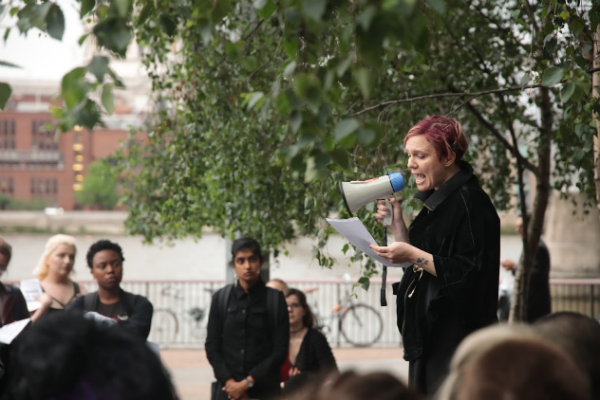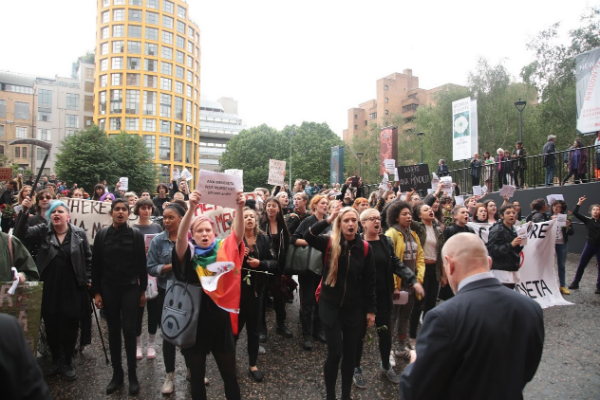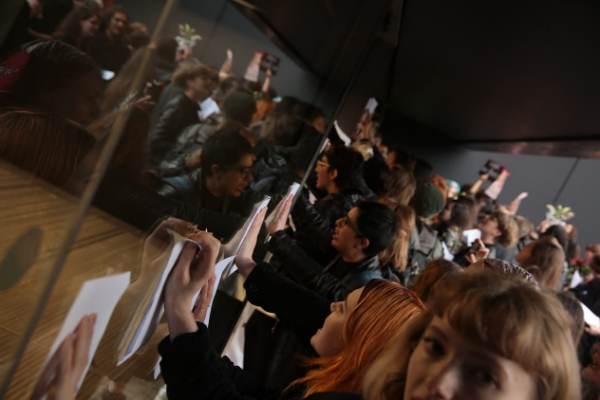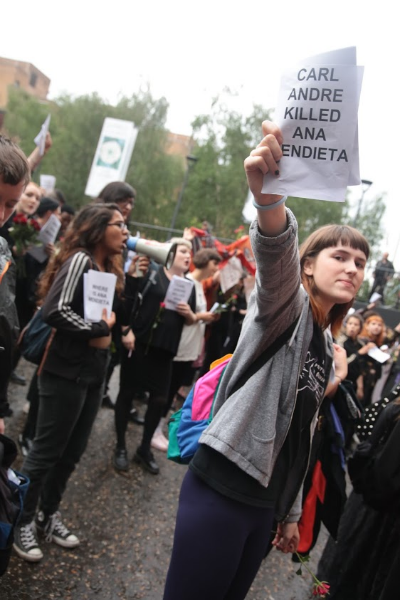Art & Exhibitions
‘Where is Ana Mendieta?’ Protesters Disrupt Preview of New Tate Modern
Works by Carl Andre are included in the new hang of the collection.

Works by Carl Andre are included in the new hang of the collection.

Naomi Rea

The artists’ preview of the hotly-anticipated new extension of the Tate Modern on Monday was disturbed when nearly 200 demonstrators gathered at the gates of the museum to protest the exclusion of Cuban artist Ana Mendieta and the inclusion of works by her former partner and alleged murderer Carl Andre in the new hang of the collection.
Ana Mendieta died in 1985 after allegedly being thrown from the 34th floor of the New York apartment she shared with Andre. Although the exact circumstances of her death may never be known, it is widely believed that Andre pushed her. Initially charged with murder, Mendieta’s former partner was acquitted on the grounds that there was insufficient evidence to prove that he had a hand in the tragedy.
The protest was organized by the WHEREISANAMENDIETA? collective, an archiving project intended to forge a platform for politicized work and push back against the erasure of women, non-binary, transgender, and people of color from art. The campaigners hope to see Carl Andre’s work removed from the Tate and replaced with that of Mendieta.

A protestor speaks to the crowd. Photo courtesy of the WHEREISANAMENDIETA collective.
“We felt it when Ana Mendieta was murdered in 1985. We asked where she was at the Guggenheim Soho protest in 1992, and 24 years later we are still asking. This protest has been happening for 24 years,” Amanda Millis, lecturer at Goldsmiths University and a speaker at the protest, said in a statement.
The demonstration is somewhat ironic as the new project at the Tate has prided itself on championing inclusion and diversity. The free collection displays will feature work by artists from more than 50 countries, and over half of the solo displays are committed to works by female artists.

Demonstrators. Photo courtesy of the WHEREISANAMENDIETA collective.
The activists marched across Millenium Bridge towards Tate’s Turbine Hall, raising banners exclaiming “WHERE IS ANA MENDIETA?” and “CARL ANDRE KILLED ANA MENDIETA!” When they arrived at the Tate, amidst rumors that Carl Andre himself was inside the building, the protesters linked arms and obstructed access to the building, pounding the glass and alternately chanting “OI TATE WE’VE GOT A VENDETTA, WHERE THE F*CK IS ANA MENDIETA?” and “I WAS PUSHED, I DID NOT FALL.”

Protestors pound the glass of the Turbine Hall. Photo courtesy of the WHEREISANAMENDIETA collective.
“The purpose of the archive is to let institutions such as the Tate know that we will not be silenced. As a victim of domestic violence and a survivor myself, I am disgusted by how frequently institutions choose to ignore the violent histories of the artists they use, particularly in relation to how they let rich white men get away with murder and violence unashamedly. We will not be silenced, and we will create our own platforms.” Olivia Luck, from the WHEREISANAMENDIETA? movement, said in a statement.
The protest was supported by the South East London branch of feminist collective Sisters Uncut, who denounced domestic violence and made a powerful speech, in which they proclaimed:
“Today we protest the wilful blindness and violence of the Tate in exhibiting the work of a murderer. Today we mourn the erasure of women of colour from art and from justice. Today we demand that the Tate recognise and exhibit Ana Mendieta’s work and remove Andre’s.”

Protestors. Photo courtesy of the WHEREISANAMENDIETA collective.